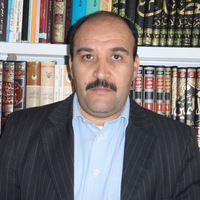
Joel Blecher
I am a historian of medieval Islam whose scholarship and teaching also addresses how the classical Islamic tradition continues to operate in the modern world. My research, which combines methods from social and intellectual history, is grounded in archives and field sites in Syria, Yemen, Saudi Arabia, Tunisia, Turkey, and India, as well as various manuscript libraries across Europe and North America.
My first book, Said the Prophet of God: Hadith Commentary across a Millennium (University of California Press, 2018), explores the rich history of the practice of hadith commentary in the times and places it flourished the most—classical Andalusia, medieval Egypt, and early modern India. Weaving together tales of public debates, high court rivalries, and colonial politics with analyses of ethnographic field notes and fine-grained arguments adorning the margins of manuscripts, this book opens new avenues for scholars who study interpretive traditions over long periods of time and geographical expanses.
My second book project, Profit and Prophecy: Islam and the Spice Trade, retells the story of the spice trade through the eyes of medieval Muslim scholars, merchants, and scholar-merchants who mixed religion and business along pilgrimage routes and port cities that stretched from the Mediterranean Sea to the Indian Ocean. Funded by the National Endowment for the Humanities and the American Council of Learned Societies, the book will offer new insights for students and scholars of global history, religion, and commercial exchange.
I have taught at Princeton University, Oberlin College, and Washington and Lee University, where I served the departments of Religion, History, as well as the School of Law. I have also been invited to speak about the Islamic world on Public Radio and has contributed to the Atlantic.
Supervisors: Muhammad Qasim Zaman, Michael Cook, Shaun Marmon, and Jonathan Brown
My first book, Said the Prophet of God: Hadith Commentary across a Millennium (University of California Press, 2018), explores the rich history of the practice of hadith commentary in the times and places it flourished the most—classical Andalusia, medieval Egypt, and early modern India. Weaving together tales of public debates, high court rivalries, and colonial politics with analyses of ethnographic field notes and fine-grained arguments adorning the margins of manuscripts, this book opens new avenues for scholars who study interpretive traditions over long periods of time and geographical expanses.
My second book project, Profit and Prophecy: Islam and the Spice Trade, retells the story of the spice trade through the eyes of medieval Muslim scholars, merchants, and scholar-merchants who mixed religion and business along pilgrimage routes and port cities that stretched from the Mediterranean Sea to the Indian Ocean. Funded by the National Endowment for the Humanities and the American Council of Learned Societies, the book will offer new insights for students and scholars of global history, religion, and commercial exchange.
I have taught at Princeton University, Oberlin College, and Washington and Lee University, where I served the departments of Religion, History, as well as the School of Law. I have also been invited to speak about the Islamic world on Public Radio and has contributed to the Atlantic.
Supervisors: Muhammad Qasim Zaman, Michael Cook, Shaun Marmon, and Jonathan Brown
less
Related Authors
Zeyd TAIBI
Abbes Laghror Khenchela
Hicham Ait Mansour
UNIVERSITE MOHAMED V RABAT
Emad Abdul Latif د. عماد عبد اللطيف
Qatar University
Mohammad Affan
University of Exeter
Rami Abu Shihab
Qatar University
InterestsView All (14)










Uploads
Books by Joel Blecher
وترتكز المقاربة التي يقدِّمها على دراسة ما وُضِعَ على "صحيح البخاري" من شروح في ثلاثة أقاليم مختلفة، وخلال ثلاثة أطوار تاريخية متباينة، مع استعراض ما أولته جماعاتُ الإسلام السياسي لشروح الحديث من اهتمامٍ في الزمن الحاضر، وتعقَّب في خلال ذلك أوجهَ الاستمرار ونواحيَ التغيير التي طرأت على هذه الشروح، بعد أن انتقل تقليدُ الشرح من عصر المخطوطات إلى عصر الطباعة ثم عصر الفيديو، ومن العصور التي كان شُرَّاحُ الحديث خلالها موصولةً أسبابُهم بالنُّخبة الحاكمة إلى العصور التي نأوا فيها بجانبهم عن السُّلطة السياسية، ومن العصور التي انتظمت بعض المرجعيات النصيَّة والمؤسسيَّة التي لا سبيل إلى منازعتها في الواقع إلى العصور التي بدا فيها من الممكن تحدِّي هذه المرجعيات نفسها.
The study of the Middle East and the broader Islamic world has been no less impacted by this new paradigm. Scholars are making daily use of digital tools and repositories including private and state-sponsored archives of textual sources, digitized manuscript collections, densitometrical imaging, visualization and modeling software, and various forms of data mining and analysis. This collection of essays explores the state of the art in digital scholarship pertaining to Islamic & Middle Eastern studies, addressing areas such as digitization, visualization, text mining, databases, mapping, and e-publication. It is of relevance to any researcher interested in the opportunities and challenges engendered by this changing scholarly ecosystem.
Papers by Joel Blecher
unofficial completion with Ibn Ḥajar’s passing. The manuscript also preserves emendations and elaborations that Ibn Ḥajar added in a later version. An analysis of the multiple layers of revision contained in this document not only advances our understanding of how Ibn Ḥajar refined his exegetical strategies as he composed his magnum opus ; it also brings to light the way in which exegesis was influenced by the complex social practice of drafting, revising, and completing a multi-volume work in the competitive and pious Mamluk scholarly environment.
Book Reviews by Joel Blecher
Teaching Documents by Joel Blecher
Conference Presentations by Joel Blecher
وترتكز المقاربة التي يقدِّمها على دراسة ما وُضِعَ على "صحيح البخاري" من شروح في ثلاثة أقاليم مختلفة، وخلال ثلاثة أطوار تاريخية متباينة، مع استعراض ما أولته جماعاتُ الإسلام السياسي لشروح الحديث من اهتمامٍ في الزمن الحاضر، وتعقَّب في خلال ذلك أوجهَ الاستمرار ونواحيَ التغيير التي طرأت على هذه الشروح، بعد أن انتقل تقليدُ الشرح من عصر المخطوطات إلى عصر الطباعة ثم عصر الفيديو، ومن العصور التي كان شُرَّاحُ الحديث خلالها موصولةً أسبابُهم بالنُّخبة الحاكمة إلى العصور التي نأوا فيها بجانبهم عن السُّلطة السياسية، ومن العصور التي انتظمت بعض المرجعيات النصيَّة والمؤسسيَّة التي لا سبيل إلى منازعتها في الواقع إلى العصور التي بدا فيها من الممكن تحدِّي هذه المرجعيات نفسها.
The study of the Middle East and the broader Islamic world has been no less impacted by this new paradigm. Scholars are making daily use of digital tools and repositories including private and state-sponsored archives of textual sources, digitized manuscript collections, densitometrical imaging, visualization and modeling software, and various forms of data mining and analysis. This collection of essays explores the state of the art in digital scholarship pertaining to Islamic & Middle Eastern studies, addressing areas such as digitization, visualization, text mining, databases, mapping, and e-publication. It is of relevance to any researcher interested in the opportunities and challenges engendered by this changing scholarly ecosystem.
unofficial completion with Ibn Ḥajar’s passing. The manuscript also preserves emendations and elaborations that Ibn Ḥajar added in a later version. An analysis of the multiple layers of revision contained in this document not only advances our understanding of how Ibn Ḥajar refined his exegetical strategies as he composed his magnum opus ; it also brings to light the way in which exegesis was influenced by the complex social practice of drafting, revising, and completing a multi-volume work in the competitive and pious Mamluk scholarly environment.